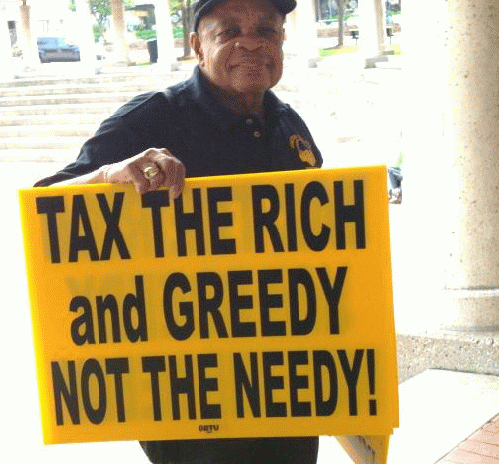Mankiw's arguments are simple: there is no "efficiency" or "fairness" in taxing the rich people, their earnings reflects their productivity (their contribution to the total production). Mankiw would say, for instance, that the CEOs deserved the high bonuses that they took in the middle of the financial crisis. But, if we are serious about productivity, then we would need immediate tax transfers from capitalists to workers: Ian Dew-Becker, Robert Gordon, and others found that the average labor productivity went up for more than 20 years in the US and in other countries while the average real wage remained stagnant.
In contrast, Buffett says that he and his super rich friends are having "extraordinary tax breaks" from making money from money while his staff is paying a higher effective tax rate. Buffett is not a "communist"; let's get over with the cold war. He just said: tax our easy profits and use those revenues to create a stable and profitable economy.
Mankiw claims that Buffett's comparison with his staff is incomplete; taxes on capital incomes should include taxation at the corporate level. However, there are many investments that are not taxed at the corporate level (e.g., municipal bonds and currency) and a complete account of taxes should consider that the workers' income is proportionally more affected by the sales tax than the capital income (propensity to consume is much smaller).
Mankiw insisted that the super rich are innovators but the great innovators are not part of the wealthy super rich group. Most of the great scientists have to continuously search for (government) grants to support their experiments. How many of the Nobel Prize winners in science are part of the top 1 percent? Most of the wealthy people are just investors earning money from money (from wealth). Even Steve Jobs created big wealth from investments in Disney and other companies. Should we give the rich a tax break because they exploit somebody's invention while we tax teachers that develop the future of our society, while we tax policemen who risk their lives for us? Who is contributing more to the society and who is paying proportionally more taxes?
Mankiw also opposed taxation to the rich based on the discredited trickle-down ideology (the wealth created at the top benefits everyone). But, Buffett contends: "I have worked with investors for 60 years and I have yet to see anyone -- not even when capital gains rates were 39.9 percent in 1976-77 -- shy away from a sensible investment because of the tax rate on the potential gain". Would you not invest in a profitable project that does not require any work effort just because you have to pay $0.40 of each dollar in taxes? Still, you will receive $0.60 that you did not have.
Mankiw is not even concerned with the equality of opportunity that is intrinsic to the American Dream, contending that the "right" of maintaining a rich dynasty should be preferred to the usage of tax money to provide educational opportunities because it is affecting the "rich family autonomy". Slavery abolition was also against the autonomy of rich families who owned slaves. Moreover, this argument contradicts his marginal productivity framework: am I earning more because of my heritage or because of my productivity?
Balzac would say that behind every great fortune lies a great crime. But, I would say that most of the rich disproportionately benefit from the financial bubbles that affect everyone and increase inequality. Furthermore, if I am able to accumulate a large wealth by paying low salaries and by selling at a high price, is because I am probably blocking the competition (inefficiencies) and taking advantage of desperate unemployed workers (inefficiencies). Those are the real inefficiencies that we should be worry about.
Consistent with the extreme right wing, Mankiw prefers a "progressive" consumption tax that no country has established appropriately because it is too complex. In practice, consumption taxes are pay equally by everyone (even by the unemployed), therefore benefiting the rich. Meanwhile, Buffett states: "My (rich) friends and I have been coddled long enough by a billionaire-friendly Congress. It's time for our government to get serious about shared sacrifice". A similar statement was published in 2011 by other millionaires such as Chuck Collins, Arul Menezes, and Maurice Levy, among others.
After all, neoclassical economists state that savings are "postponed consumption". But, the mega rich would not be able to consume their wealth in the future (e.g., if Bill Gates were to consume $1 million every day, he would need to live 170 years more to expend all his wealth!). What is more reasonable: to tax workers who may not have their productivity correctly measured (productivity is measured in manageable prices, not in physical quantities) or taxing wealthy people who make easy money that would not even have time to consume?





